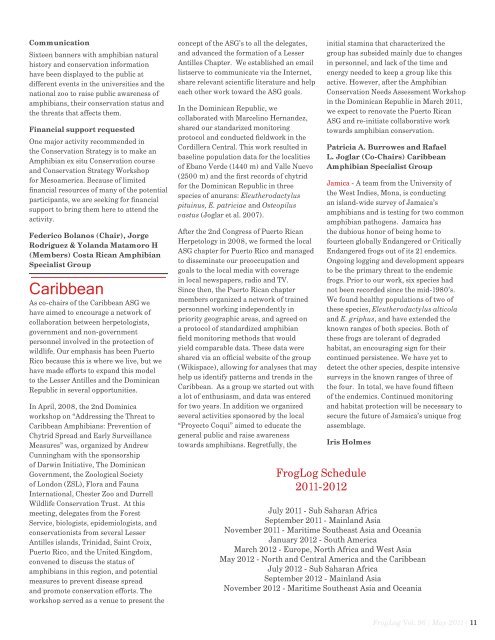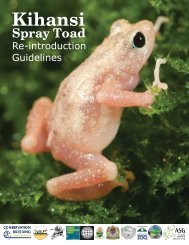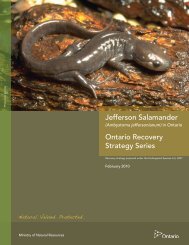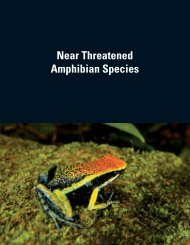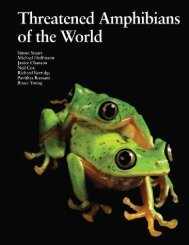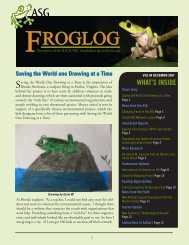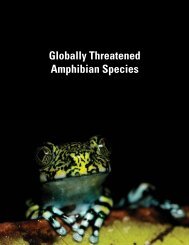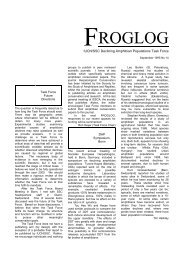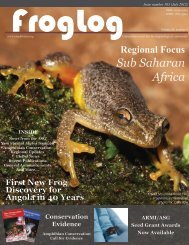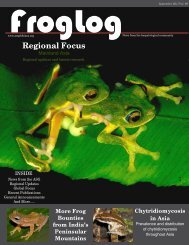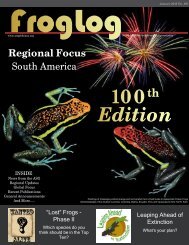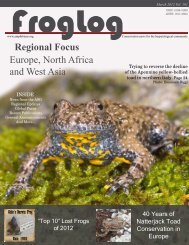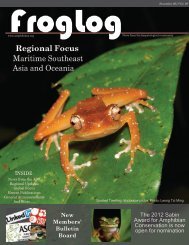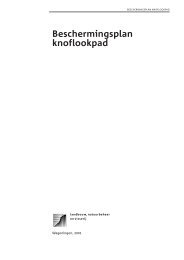download the FrogLog 96 - Amphibian Specialist Group
download the FrogLog 96 - Amphibian Specialist Group
download the FrogLog 96 - Amphibian Specialist Group
Create successful ePaper yourself
Turn your PDF publications into a flip-book with our unique Google optimized e-Paper software.
Communication<br />
Sixteen banners with amphibian natural<br />
history and conservation information<br />
have been displayed to <strong>the</strong> public at<br />
different events in <strong>the</strong> universities and <strong>the</strong><br />
national zoo to raise public awareness of<br />
amphibians, <strong>the</strong>ir conservation status and<br />
<strong>the</strong> threats that affects <strong>the</strong>m.<br />
Financial support requested<br />
One major activity recommended in<br />
<strong>the</strong> Conservation Strategy is to make an<br />
<strong>Amphibian</strong> ex situ Conservation course<br />
and Conservation Strategy Workshop<br />
for Mesoamerica. Because of limited<br />
financial resources of many of <strong>the</strong> potential<br />
participants, we are seeking for financial<br />
support to bring <strong>the</strong>m here to attend <strong>the</strong><br />
activity.<br />
Federico Bolanos (Chair), Jorge<br />
Rodriguez & Yolanda Matamoro H<br />
(Members) Costa Rican <strong>Amphibian</strong><br />
<strong>Specialist</strong> <strong>Group</strong><br />
Caribbean<br />
As co-chairs of <strong>the</strong> Caribbean ASG we<br />
have aimed to encourage a network of<br />
collaboration between herpetologists,<br />
government and non-government<br />
personnel involved in <strong>the</strong> protection of<br />
wildlife. Our emphasis has been Puerto<br />
Rico because this is where we live, but we<br />
have made efforts to expand this model<br />
to <strong>the</strong> Lesser Antilles and <strong>the</strong> Dominican<br />
Republic in several opportunities.<br />
In April, 2008, <strong>the</strong> 2nd Dominica<br />
workshop on “Addressing <strong>the</strong> Threat to<br />
Caribbean <strong>Amphibian</strong>s: Prevention of<br />
Chytrid Spread and Early Surveillance<br />
Measures” was, organized by Andrew<br />
Cunningham with <strong>the</strong> sponsorship<br />
of Darwin Initiative, The Dominican<br />
Government, <strong>the</strong> Zoological Society<br />
of London (ZSL), Flora and Fauna<br />
International, Chester Zoo and Durrell<br />
Wildlife Conservation Trust. At this<br />
meeting, delegates from <strong>the</strong> Forest<br />
Service, biologists, epidemiologists, and<br />
conservationists from several Lesser<br />
Antilles islands, Trinidad, Saint Croix,<br />
Puerto Rico, and <strong>the</strong> United Kingdom,<br />
convened to discuss <strong>the</strong> status of<br />
amphibians in this region, and potential<br />
measures to prevent disease spread<br />
and promote conservation efforts. The<br />
workshop served as a venue to present <strong>the</strong><br />
concept of <strong>the</strong> ASG’s to all <strong>the</strong> delegates,<br />
and advanced <strong>the</strong> formation of a Lesser<br />
Antilles Chapter. We established an email<br />
listserve to communicate via <strong>the</strong> Internet,<br />
share relevant scientific literature and help<br />
each o<strong>the</strong>r work toward <strong>the</strong> ASG goals.<br />
In <strong>the</strong> Dominican Republic, we<br />
collaborated with Marcelino Hernandez,<br />
shared our standarized monitoring<br />
protocol and conducted fieldwork in <strong>the</strong><br />
Cordillera Central. This work resulted in<br />
baseline population data for <strong>the</strong> localities<br />
of Ebano Verde (1440 m) and Valle Nuevo<br />
(2500 m) and <strong>the</strong> first records of chytrid<br />
for <strong>the</strong> Dominican Republic in three<br />
species of anurans: Eleu<strong>the</strong>rodactylus<br />
pituinus, E. patriciae and Osteopilus<br />
vastus (Joglar et al. 2007).<br />
After <strong>the</strong> 2nd Congress of Puerto Rican<br />
Herpetology in 2008, we formed <strong>the</strong> local<br />
ASG chapter for Puerto Rico and managed<br />
to disseminate our preoccupation and<br />
goals to <strong>the</strong> local media with coverage<br />
in local newspapers, radio and TV.<br />
Since <strong>the</strong>n, <strong>the</strong> Puerto Rican chapter<br />
members organized a network of trained<br />
personnel working independently in<br />
priority geographic areas, and agreed on<br />
a protocol of standardized amphibian<br />
field monitoring methods that would<br />
yield comparable data. These data were<br />
shared via an official website of <strong>the</strong> group<br />
(Wikispace), allowing for analyses that may<br />
help us identify patterns and trends in <strong>the</strong><br />
Caribbean. As a group we started out with<br />
a lot of enthusiasm, and data was entered<br />
for two years. In addition we organized<br />
several activities sponsored by <strong>the</strong> local<br />
“Proyecto Coqui” aimed to educate <strong>the</strong><br />
general public and raise awareness<br />
towards amphibians. Regretfully, <strong>the</strong><br />
<strong>FrogLog</strong> Schedule<br />
2011-2012<br />
initial stamina that characterized <strong>the</strong><br />
group has subsided mainly due to changes<br />
in personnel, and lack of <strong>the</strong> time and<br />
energy needed to keep a group like this<br />
active. However, after <strong>the</strong> <strong>Amphibian</strong><br />
Conservation Needs Assessment Workshop<br />
in <strong>the</strong> Dominican Republic in March 2011,<br />
we expect to renovate <strong>the</strong> Puerto Rican<br />
ASG and re-initiate collaborative work<br />
towards amphibian conservation.<br />
Patricia A. Burrowes and Rafael<br />
L. Joglar (Co-Chairs) Caribbean<br />
<strong>Amphibian</strong> <strong>Specialist</strong> <strong>Group</strong><br />
Jamica - A team from <strong>the</strong> University of<br />
<strong>the</strong> West Indies, Mona, is conducting<br />
an island-wide survey of Jamaica’s<br />
amphibians and is testing for two common<br />
amphibian pathogens. Jamaica has<br />
<strong>the</strong> dubious honor of being home to<br />
fourteen globally Endangered or Critically<br />
Endangered frogs out of its 21 endemics.<br />
Ongoing logging and development appears<br />
to be <strong>the</strong> primary threat to <strong>the</strong> endemic<br />
frogs. Prior to our work, six species had<br />
not been recorded since <strong>the</strong> mid-1980’s.<br />
We found healthy populations of two of<br />
<strong>the</strong>se species, Eleu<strong>the</strong>rodactylus alticola<br />
and E. griphus, and have extended <strong>the</strong><br />
known ranges of both species. Both of<br />
<strong>the</strong>se frogs are tolerant of degraded<br />
habitat, an encouraging sign for <strong>the</strong>ir<br />
continued persistence. We have yet to<br />
detect <strong>the</strong> o<strong>the</strong>r species, despite intensive<br />
surveys in <strong>the</strong> known ranges of three of<br />
<strong>the</strong> four. In total, we have found fifteen<br />
of <strong>the</strong> endemics. Continued monitoring<br />
and habitat protection will be necessary to<br />
secure <strong>the</strong> future of Jamaica’s unique frog<br />
assemblage.<br />
Iris Holmes<br />
July 2011 - Sub Saharan Africa<br />
September 2011 - Mainland Asia<br />
November 2011 - Maritime Sou<strong>the</strong>ast Asia and Oceania<br />
January 2012 - South America<br />
March 2012 - Europe, North Africa and West Asia<br />
May 2012 - North and Central America and <strong>the</strong> Caribbean<br />
July 2012 - Sub Saharan Africa<br />
September 2012 - Mainland Asia<br />
November 2012 - Maritime Sou<strong>the</strong>ast Asia and Oceania<br />
<strong>FrogLog</strong> Vol. <strong>96</strong> | May 2011 | 11


